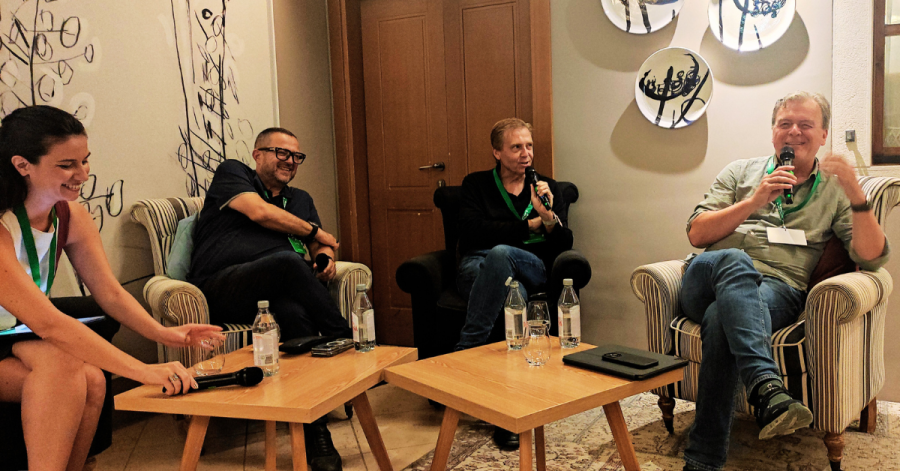At this year’s Hellen’s Rock Founders’ Retreat, a panel discussion moderated by Irina Obushtarova brought together influential leaders from the tech and business sectors. The conversation featured Sacha Dragic, founder of Hellen’s Rock and Superbet; Hans-Holger Albrecht, former CEO of Deezer and Chairman of the Board at Superbet; and Mark Porter, CTO at dbt Labs and Board Member at Superbet. Their insights on building effective teams and scaling businesses provided valuable takeaways for entrepreneurs and scaling leaders alike.
The Importance of People and Culture
Elaborating on his career journey, Hans emphasized the critical role of people in any organization, stating, “The main reason I chose to work with any company was always people. If you have the right people and culture – you can achieve whatever you want.”
This sentiment was echoed by Sacha, who noted: “When building a business, you always get back to the fact that you need a team that completes you.”
Mark added a nuanced perspective, suggesting that as companies grow, leaders must evolve as well. “As you grow as a company, you have to change who you are – that’s the hardest management challenge that needs to be solved to satisfy the needs of customers and employees,” he explained.
Balancing Focus and Adaptability
The discussion also touched on the delicate balance between maintaining focus and being open to new trends. Sacha advised, “You need to find the balance between always being open-minded to new trends and not letting these new trends defocus you from what’s really important.” Hans reinforced this idea, stating, “When it comes to focus, the key point is always to stay close to your customers.”
Mark elaborated on the evolving nature of focus, stating, “Focus is going to change throughout time. As a founder, you might be sure you are the smartest person in the room. Even if it’s true, you need to seek to disconfirm your beliefs.”
The Role of Leadership and Delegating
A recurring theme was the importance of delegation and the leader’s role in setting a vision. Mark noted, “The role of a leader is to set the vision and take care of the people.” He reiterated the need for leaders to delegate effectively, stating, “You should be delegating decisions; if you’re uncomfortable with delegating – there’s a problem either with you or with the person.”
Sacha shared his personal experience with delegation, saying, “At the beginning, you’re doing everything as a founder but as you grow as an organization and as a person, you need to start asking yourself, ‘Am I good at all of these roles or just 1-2 of them?’”
He went on: “I was never a detail-oriented person so I tried to keep around me people who excelled at that. In general, I tried getting better and better at the things I am good at, and for the rest, I always try to find the best people that complete me. For me, the focus came from being able to find these people who were better than me at being CEO or Chairman of Superbet – this really allowed me to have the time to speak with people, to learn, to think what are the next big things coming.”
Dealing with Tough Times and Imposter Syndrome
The panelists also discussed the challenges of leadership, particularly during tough times. Hans remarked, “In good times, everyone can be a good manager. In bad times, you see the difference between good and bad managers.”
Mark added that leaders often face imposter syndrome, stating, “We all feel the impostor syndrome sometimes, but at the top of the organization, you need to have the confidence to lead the company. What gets me through is having this muscle, this thought of ‘I have no idea what I am doing but you know what – I’ve had that thought 20 times in the past 5 years and we’ve made it through. So, you need to accept that you may not know what to do, that you may be failing but be confident about your ability to work the problem.”
The insights shared at the Hellen’s Rock Founders’ Retreat highlight that successful leadership is not just about individual brilliance but about building teams that complement and enhance one another. By focusing on culture, maintaining adaptability, and embracing the challenges of leadership, entrepreneurs can create organizations that thrive in an ever-changing landscape.








